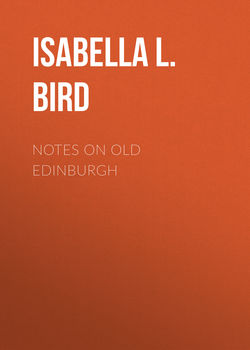Notes on Old Edinburgh

Реклама. ООО «ЛитРес», ИНН: 7719571260.
Оглавление
Isabella L. (Isabella Lucy) Bird. Notes on Old Edinburgh
PREFATORY NOTE BY THE REV. DR. HANNA
CHAPTER I
CHAPTER II
CHAPTER III
CHAPTER IV
Отрывок из книги
It has been my fortune to see the worst slums of the Thames district of London, of Birmingham, and other English and foreign cities, the “water-side” of Quebec, and the Five Points and mud huts of New York, and a short time ago a motive stronger than curiosity induced me to explore some of the worst parts of Edinburgh – not the very worst, however. Honest men can have no desire to blink facts, and no apology is necessary for stating the plain truth, as it appears to me, that there are strata of misery and moral degradation under the shadow of St. Giles’s crown and within sight of Knox’s house, more concentrated and unbroken than are to be met with elsewhere, even in a huge city which, by reason of a district often supposed to have no match for vice and abjectness, is continually held up to public reprobation. The Rev. R. Maguire, rector of St. James’s, Clerkenwell, accompanied me through a portion only of the district visited, and he expressed his opinion then, and since more formally in print, that more dirt, degradation, overcrowding, and consequent shamelessness and unutterable wretchedness, exist in Edinburgh than in any town of twice its size, or in any area of similar extent to the one explored, taken from the worst part of London. With this opinion my own convictions cordially concur. We have plenty of awful guilt-centres in London – as, for instance, the alleys leading out of Liquorpond Street and the New Cut, but even the worst are broken in upon by healthy neighbourhoods. Here there is a loathsome infectious sore, occupying a larger area than anywhere else – a district given up in great measure to moral degradation, which extends from the Lawnmarket to Holyrood, from Holyrood along the parallel streets of the Cowgate, the Grassmarket, and the West Port, including most of the adjacent wynds and closes, and only terminating with Cowfeeder Row.
My object was to compare a certain section of Edinburgh, both by day and night, with a similar area in the city before alluded to. In company with two philanthropic gentlemen, who did not hesitate to expose these social plague-spots, and guided in one mysterious locality by one of the lieutenants of police, I explored at various times several closes in the High Street, Cowgate, and West Port, going by “house-row.” In all cases the people were civil and willing to admit us, and few allowed us to depart without expressing a hope that some good would come out of the efforts proposed to be made for them. In many houses only the children were at home, but they answered our questions with such quick comprehension and painfully precocious intelligence that we were not left in doubt as to the circumstances of their parents.
.....
It is a pitiful sight in the street, but followed to the homes this lack of water helps to degrade, pity for the sufferers mingles with indignant surprise that proprietors of the best paying property to be found (for so the closes are) have not been compelled ere this to have at least a pipe and tap in every close. Outside the great Reformer’s house is the well of pure water, difficult of access for most, nearly inaccessible at times to the feeble, the diffident, and the old. Under the same house is the whisky-shop, easy enough to reach, and the whisky all too easy to procure – only the laying down a few pence, and the fluid which makes life brighter for an hour is at the lips without waiting or scuffling. How can our sad and sorely-tempted ones escape the snare? Limited water and unlimited whisky, crowded dens and unwholesome air; we need nothing more to make a city full of drunkards.
We followed this water grievance into thirty-seven houses that day, and there was scarcely one in which it was not enlarged upon. Did our eyes wander round a room ever so stealthily, its occupier was ready to forestall the glance by saying, “Ah, sirs, it’s the dirt ye’re looking at, but how’s puir folk like us to be clean as has to haul every drop of water from that well?” Did we shrink ever so slightly from a child whose head and clothing were one mass of dirt, the movement was perceived, and the want of water, the distance from the well, and the long long stair, were the apologies offered.
.....